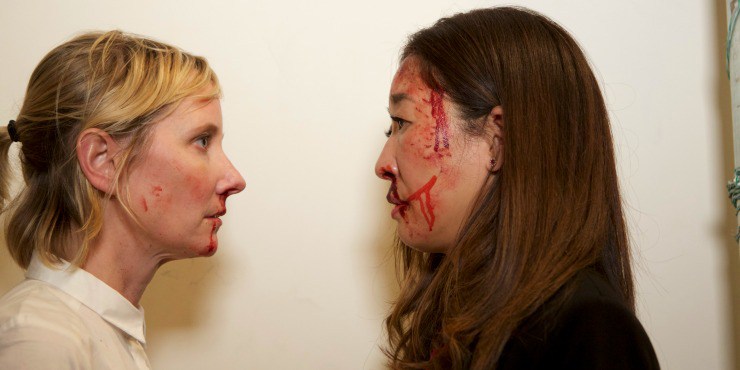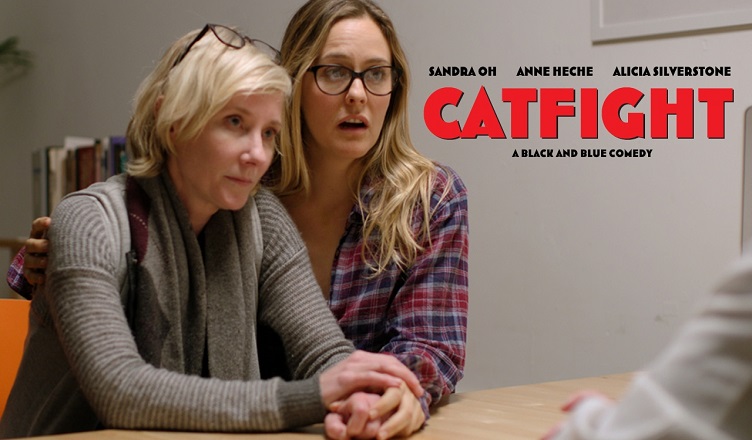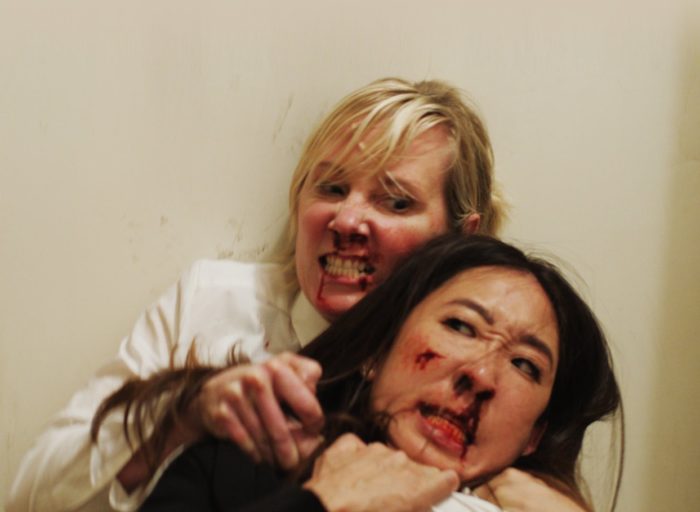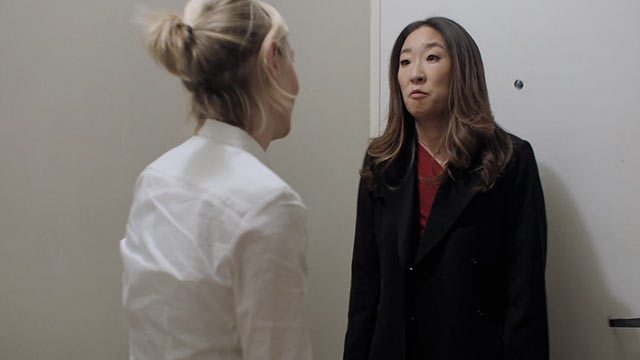“Catfight” is an outrageous, hyperbolic comedy defined by female competition, rock bottom and psychotic breaks that take the phrase “nasty woman” to a whole new level. Sandra Oh and Anne Heche star as two ex-college friends who serendipitously meet in their adult lives, but reliving that rancor leads to three bloodthirsty, animated fistfights throughout the film. With trope-less queer characters, twisted political commentary and animalistic, Mean Girls-style brawls, Onur Tukel’s “Catfight” is 2017’s first killer queer film.

Veronica (Oh) and Ashley (Heche) live in stark contrast. There’s Veronica, a snooty, self-involved nihilist who speaks in quips that are customary to Oh: her son asks her if they’re still religious, to which she replies “No.” He asks, “Then why do we pray?” Oh retorts, “Just in case.” Somewhat of an alcoholic, Veronica is married to a defense contractor helping the U.S. military prepare for a “war on terror.” This begs the question: Is this story set during the Bush administration?
Actually, it’s not. “Catfight” is set in a culturally dystopian—yet terrifyingly parallel—present day America. The political commentary is unhinged; there’s even a late night host, a male comedian monologuing in front of a blue curtain (an obvious dig at Jimmy Fallon) who pops up throughout the movie to comment mildly on the war before inviting “the fart machine” out on stage (a man in a diaper who makes fart noises).
Ashley, a manic-depressive artist whose mental state is reflected in her demented, war-ridden, red paintings, is on the edge of financial disaster. Color and art are thematic in this movie; the reds and yellows in Ashley’s work contrasts with the clean, blue artwork of her studio assistant, who she emotionally abuses. Ashley leans heavily on her partner Lisa, played by Alicia Silverstone. Lisa begs her to pitch in more, but Ashley assures her that her work is on the brink of major success. Ashley claims that Lisa is more masculine and thus, should do the heavy lifting in their relationship. When Lisa contests this, Ashley quips that Lisa wears the strap-on dildo more, and thus, is more masculine.

The queer storyline plays fantastically; while usually a male writer taking on a woman-on-woman relationship feels forced and problematic, Tukel seemed to tackle it as best he could. We get to see the couple deal with big life moments; from conducting an in-home artificial insemination to arguments about fertility and some really sweet exchanges of affection between the two women. Of course, not all queer couples deal with these issues, but these characters are concentrated versions of themselves; Ashley and Lisa fell somewhere on the spectrum of real, thorough queer women and “The L Word” lesbians, which are like cartoon versions of lesbians. There were moments that felt like these women were projections of a lesbian relationship in Tukel’s imagination, like when the couple jokes that they hope their baby isn’t a boy. But the joke got big laughs, from myself included. Truly, everything in “Catfight” is thematically big; the “Mortal Kombat”-like fight scenes are spliced with swinging music and blistering tubas. The blinding colors and crude plotlines are what make “Catfight” “Catfight”—so, the bigness of their queerness actually works.
Veronica and Ashley get re-acquainted at a fancy party; Veronica is a guest with her husband, while Ashley is the caterer. In their brief conversation, we find out that the two women were friends in college, but Veronica ghosted when Ashley came out as gay. Although she insists she didn’t stop hanging out with her because she was gay, we’re never fully clued in as to what happened. Although, one can probably assume Veronica was that straight girl in college—the one who flirts with her queer friend until it reaches a boiling point, then separates herself instead of confronting her own ambiguity.

The stark contrast of their lives is too much for Ashley to handle, which leads to the first smack-down. Oh takes the first swing and clocks Heche in the face. The fight escalates to a reckless “Kill Bill”-style battle. The fighting is fierce and over-the-top, like an anime bout with cracking punches and Tarantino screams. At this point, the movie feels like we walked into a comic book shop and found a graphic novel lying open to the middle of their story. Both Veronica and Ashley are despicable and unkind women, which plays magically for viewers; they’re fun to watch.
Throughout the film, we see the rise and fall of these two characters run parallel to the second war in the Middle East, (at one point the late night host announces that the war ended and western culture is spreading like crazy in the Middle East. He exclaims, “It worked!”) While Veronica and Ashley’s circumstances change as the movie trudges forward, the duo remains miserable and continues to patronize everyone surrounding them.
They meet twice more to settle their revenge-driven bloodlust for each other. The second and third brawls are even more Tarantino than the first, escalating with the use of savage props, like hammers and wrenches and tires, oh my! And in case the homage to “Kill Bill” wasn’t crystal clear, just before the final fight, Ashley jeers, “We have some unfinished business.”
Only women can understand the animosity of a competitive female-on-female relationship. In fact, this heightened reality feels like a fever dream; minus the outright violence, it’s the fight with our ex we never got to have. The characters are like parodies of themselves. There’s even Veronica’s crazy Aunt Charlie who talks to the trees in her yard, naming them Hillary (a “strong” but “untrustworthy” tree) and Donald (“He’s an asshole”). At times, the movie felt like a series of delicately crafted sketches. As the kids would say, “Catfight” truly is “extra.”

“Catfight” was one of the loudest and angriest female-driven comedies of the past few years. Given the post-Hillary Clinton political climate, the violent rage and reckless abandon of the movie felt like a much-needed release. From Tukel’s impassioned writing to Heche’s maniacal acting, this film was a colorful, no holds barred bloodbath. Though the characters were intentionally despicable, women everywhere can learn a lesson from ‘Catfight’s’ uninhibitedness.
“Catfight’ is now in theaters.

What Do You Think?